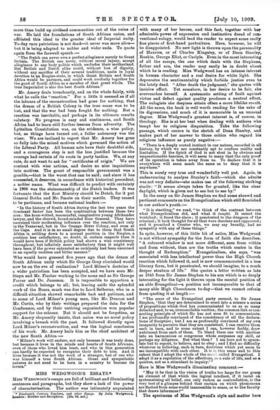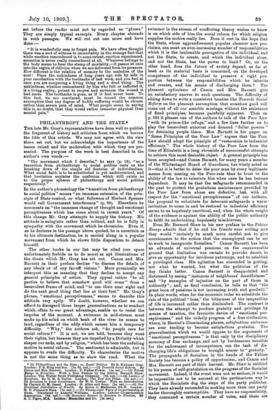MISS WEDGWOOD'S ESSAYS.*
MISS WEDGWOOD'S essays are full of brilliant and illuminating sentences and paragraphs, but they show a lack of the power of characterisation. The author was intimately acquainted
* Nineteenth Centuni Teachers, and other Essays. By Julia Wedgwood, London: Hodder and Stoughton. [10a. 6d. net.] with many of her heroes, and this fact, together with her admirable power of expression and instinctive dread of con.
ventional eulogy, would lead the reader to expect some really flue pieces of first-hand portraiture. Here, however, lie will be disappointed. No new light is thrown upon the personality of Maurice, or of Charles Kingsley, or of Dean Stanley,
Ruskin, George Eliot, or Carlyle. Even in the most interesting of all the essays, the one which deals with the Stephens,
father and son, the reader may easily be in doubt about which he is reading. Miss Wedgwood has an intense interest in human character and a real desire for white light. She deprecates the sentimentality which forbids justice even to the lately dead. "After death the judgment," she quotes with incisive effect. Yet somehow, in her desire to be fair, she overreaches herself. A systematic setting of fault against virtue and defect against quality produces a neutral effect. The eulogists she despises attain often a more lifelike result.
All the same, the book is well worth reading for the sake of its digressions, and much of it is memorable in an unusual degree. Miss Wedgwood's greatest interest is, of course, in theology. She is at her best when dealing with authors who tempt her to religious disquisition. Take the following passage, which occurs in the sketch of Dean Stanley, and makes part of her answer to those critics who regard his religious influence as purely negative :—
"There is a deeply rooted instinct in our nature, recorded in all history, by which we are constantly apt to confuse reality and limitation. If the Spirit of God is not shut in by obvious and unquestionable barriers, it will seem to many that the only proof of its operation is taken away from us. To declare that it is everywhere will seem much the same as to deny that it is any where."
This is surely very true and wonderfully well put. Again, in endeavouring to analyse Stanley's faith—which she admits was not very definite—she makes use of the following striking "It seems always taken for granted, like the clear daylight, which is given not to see but to see by."
In the essay on Sir James Stephen we find some shrewd and pertinent comments on the Evangelicalism which still flourished in our author's youth :—
" It is startling," we read, "to think of the contrast between what Evangelicalism did, and what it taught. It raised the wretched ; it freed the slave ; it penetrated to the dungeon of the criminal ; it took thought for all that were desolate and oppressed; and it preached a Creator who, we may say broadly, had no sympathy with any of these things."
In spite, however, of this little bit of satire, Miss Wedgwood is not without sympathy for the form of faith she describes. "A coloured window is not more different, seen from within and from without, than are the truths which centre in the thought of Redemption." Evangelicalisni, she says, "was associated with less intellectual power than the High Church
reaction which followed it, and is now commemorated in a less literary form, but it penetrated, we should imagine, to a much deeper stratum of life." She quotes a letter written as late as 1845 from Sir James Stephen to his son which is so deeply interesting for the light it throws upon the mental position of an able Evangelical—a position not incomparable to that of many able High Churchmen to-day—that we cannot refrain from quoting it at length :—
" The error of the Evangelical party seemed, to Sir Samos Stephen, 'that they are determined to erect into a science a series of propositions which God has communicated to us as so many detached and, to us, irreconcilable verities ; the common link or con- necting principle of which He has not seen fit to communicate. I am profoundly convinced of the consistency of all the declara- tions of Scripture; but I am as profoundly convinced of my own incapacity to perceive that they are consistent. I can receive them each in turn, and to some extent I can, however feebly, draw nutriment from each of them. To blend them one with another into an harmonious or congruous whole surpasses my skill, or perhaps my diligence. But what then ? I am here not to specu- late but to repent, to believe, and to obey ; and I find no difficulty whatever in believing, each in turn, doctrines which yet seem to me incompatible with each other. It is in this sense and to this extent that I adopt the whole of the crel called Evangelical. I adopt it as a regulation of the affections, as a rule of life, and as a quietus, not as a stimulant to inquiry."
Here is Miss Wedgwood's illuminating comment:—.
"May it be that in the vision of truths too large for our grasp an element of that which the logical intellect, if it insist on systematising all belief, can only reckon as contradiction, is the very test of a glimpse behind that curtain on which phenomena are flashed from some world inaccessible to sense, or to the faculty that draws inferences P" The specimens of Miss Wedgwood's style and matter here set before the reader must not be regarded as "plums." They are simply typical excerpts. Every chapter abounds in such passages. We will cut out one more and have done :—
" It is wonderfully easy to forget pain. We have often thought there was a sort of witness to immortality in the strange fact that while emotion remembered is, to some extent, emotion experienced, sensation is never really remembered at all. Whatever belongs to the body seems to bear the stamp of mortality,—it passes at once into the region of oblivion when we are delivered from its pressure. How different is the relation of memory to the maladies of the soul! Place the unkindness of long years ago side by side in your recollection with the toothache of last week, and you feel at once you are comparing a living thing and a dead thing. The unkindness, whether remembered by him who felt or inflicted it, is a living reality, potent to reopen and envenom the wound it had made. The toothache is gone, as if it had never been. To this fact, we are convinced, must be traced the common assumption that any degree of bodily suffering would be chosen rather than severe pain of mind. What people mean in saying this is, no doubt, that they would rather remember physical than mental pain."











































 Previous page
Previous page